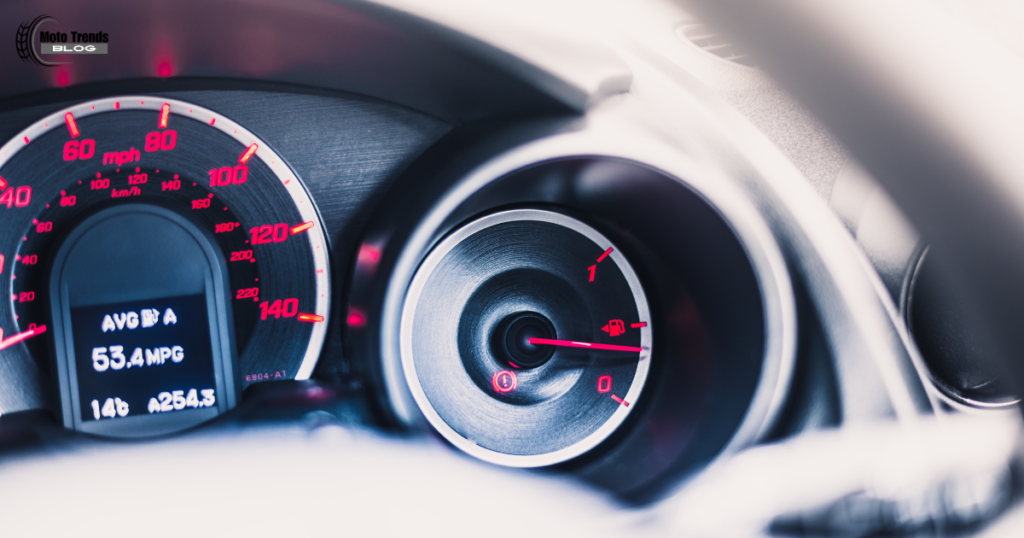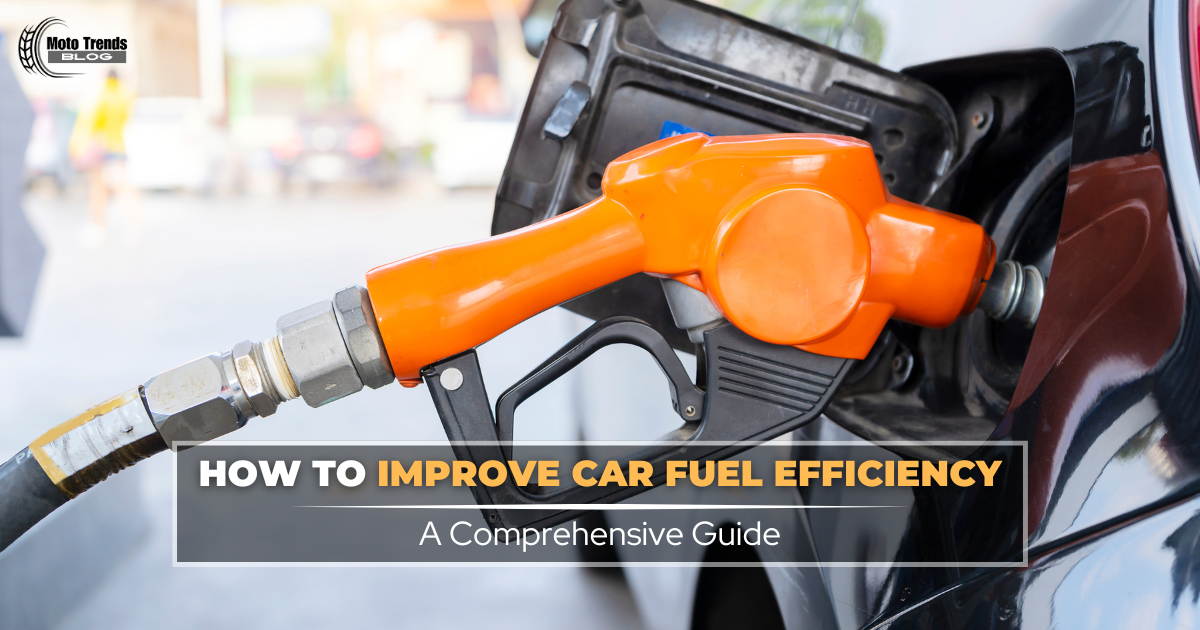Fuel efficiency is a key concern for every car owner, especially as fuel prices continue to fluctuate and environmental awareness grows. Knowing how to improve car fuel efficiency will not only save you money at the gas pump but also reduce your carbon footprint. In this blog, we’ll explore practical and actionable ways to improve car fuel efficiency, from everyday driving habits to essential car maintenance. By understanding the factors that affect fuel economy and implementing the right strategies, you can have a significant impact on your vehicle’s performance.
Understanding Fuel Efficiency
Before going into the steps to improve car fuel efficiency, it’s essential to understand what fuel efficiency means and why it’s important.
What is Fuel Efficiency?
Fuel efficiency refers to the distance a car can travel per unit of fuel, typically measured in miles per gallon (MPG) in the U.S. or liters per 100 kilometers (L/100 km) in other countries. The higher the MPG or the lower the L/100 km, the more fuel efficient the vehicle. Many factors contribute to a car’s fuel efficiency, including engine design, aerodynamics, weight, and, most importantly, how the car is driven and maintained.
Why Fuel Efficiency Matters
- Economic Savings: The most direct benefit of improving fuel efficiency is a reduction in fuel costs. For example, if your car gets 25 MPG and you drive 12,000 miles annually, switching to a car that provides 30 MPG could save you hundreds of dollars per year.
- Environmental Impact: More fuel-efficient cars emit fewer greenhouse gases, helping to reduce the environmental impact of your driving habits. With climate change concerns at the forefront, adopting practices that improve fuel efficiency is a step toward a more sustainable future.
- Vehicle Longevity: Efficient driving and regular maintenance can help your car last longer. By reducing the stress on the engine and other components, you extend the life of your vehicle and reduce the need for costly repairs.
Driving Habits That Can Improve Fuel Efficiency
Your driving habits play a key role in determining how much fuel your car consumes. By adopting more efficient driving practices, you can improve car fuel efficiency and reduce fuel expenses.
1. Maintain a Steady Speed
One of the most effective ways to improve car fuel efficiency is to maintain a steady speed. Rapid acceleration and sudden braking make your engine work harder, leading to higher fuel consumption. On highways or open roads, use cruise control to maintain a steady speed. This technique helps reduce fuel consumption by preventing unnecessary fluctuations in speed, especially during long trips.
2. Avoid Harsh Acceleration and Braking
Smooth acceleration and gentle braking can make a significant difference in fuel efficiency. When you accelerate quickly or brake suddenly, your car uses more fuel than it would if you drove more slowly. To improve car fuel efficiency, avoid jackrabbit starts and hard stops. Instead, reduce acceleration and try to brake first, allowing your vehicle to slow down naturally.
3. Don’t Idle for Long Periods
Idling wastes fuel, especially when your car is stationary for long periods of time. Although it’s commonly believed that idling uses more fuel than revving the engine, long periods of idling also consume unnecessary fuel. If you’re stopped for more than 30 seconds, it’s more fuel-efficient to turn off the engine and restart it when you’re ready to drive again. This is especially important when you’re waiting in long lines or in heavy traffic.
4. Lighten the Load
The heavier your vehicle is, the more fuel it needs to run. Carrying unnecessary items in your trunk or on a roof rack adds extra weight, which reduces fuel efficiency. To improve car fuel efficiency, clean your vehicle regularly and remove any items you don’t need. Additionally, roof racks and carriers can increase drag, further reducing fuel consumption. Remove them when not in use to reduce aerodynamic drag.
5. Plan Your Trips
Efficient trip planning can have a significant impact on your car’s fuel efficiency. Combining multiple errands into a single trip or driving during off-peak hours can help you avoid traffic and reduce time spent idling. Planning your route to avoid congested areas or road construction will help maintain a steady speed and save fuel in the long run.
Regular Maintenance to Improve Car Fuel Efficiency
Proper car maintenance is essential to keep your vehicle running smoothly and ensure optimal fuel efficiency. Here are some key maintenance tasks to improve car fuel efficiency:
1. Keep Tires Properly Inflated
Under-inflated tires create more rolling resistance, making your engine work harder and consume more fuel. On the other hand, properly inflated tires can improve fuel efficiency by up to 3%. To maintain the correct tire pressure, check your tire pressure regularly, at least once a month, using a reliable gauge. Your car’s owner’s manual will provide the recommended PSI for your tires.
2. Change the Oil Regularly
Motor oil lubricates the engine, ensuring smooth operation. Over time, oil can become dirty and less effective, which can lead to reduced fuel efficiency. Changing the oil regularly and using the right type of oil for your vehicle can improve car fuel efficiency by reducing engine friction and ensuring the engine runs optimally. Typically, you should change your oil every 3,000 to 5,000 miles, depending on your vehicle and driving conditions.
3. Replace the Air Filter
A clogged or dirty air filter reduces the amount of air flowing into the engine, which can lead to incomplete combustion and poor fuel efficiency. Replacing a dirty air filter is an easy and cost-effective way to improve car fuel efficiency. Check your air filter every 12,000 to 15,000 miles, or more often if you drive in dusty or polluted areas.
4. Check and Replace Spark Plugs
Spark plugs ignite the fuel in your engine’s cylinders. Over time, spark plugs can wear out or become fouled, leading to inefficient combustion and reduced fuel economy. Replacing old spark plugs can help your engine burn fuel more efficiently, increasing fuel efficiency by up to 30%. If your car’s spark plugs need to be replaced, get them replaced according to the manufacturer’s schedule.
5. Keep Your Engine Tuned
An engine that’s not running at peak performance can consume more fuel. Regular tune-ups, which include checking and adjusting the ignition system, fuel injectors and other engine components, can help keep your car running smoothly and efficiently. A well-tuned engine reduces fuel waste and ensures that you’re getting the best mileage out of your car.

Technological Aids and Upgrades to Improve Fuel Efficiency
With the advancement in automotive technology, there are many tools and upgrades available to help you improve car fuel efficiency..
1. Use Fuel-Efficient Apps
Fuel-efficient driving isn’t just about physical changes to your car or driving style. Modern apps like Fuelly, GasBuddy, and Waze can help you track your fuel consumption, find the cheapest gas prices, and plan the most efficient routes. These apps provide information that can help you stay on top of your fuel economy.
2. Upgrade to Low Rolling Resistance Tires
Low rolling resistance tires are designed to reduce friction with the road, which means your car requires less power to move. These tires not only improve car fuel efficiency but also last longer, saving you money in the long run. Consider switching to low rolling resistance tires when replacing your existing tires, especially if you frequently drive long distances.
3. Install Aerodynamic Accessories
If you drive a lot on highways or long trips, investing in aerodynamic accessories like a roof deflector, side skirts, or a rear spoiler can help reduce drag, thereby improving fuel efficiency. These upgrades improve the way air flows over your car, allowing it to move more smoothly and consume less fuel.
4. Consider a Hybrid or Electric Vehicle
While this may be a long-term solution, switching to a hybrid or electric vehicle (EV) is one of the most effective ways to improve car fuel efficiency. Hybrids combine an electric motor with a gasoline engine, while EVs run solely on electricity. Both options offer substantial fuel savings compared to traditional gas-powered cars and can help reduce your carbon footprint substantially.
Common Myths About Fuel Efficiency
As with most things, there are many myths about fuel efficiency that can lead to misconceptions. Let’s debunk some of the most common myths:
1. Premium Fuel Improves Gas Mileage
One of the most persistent myths is that using premium fuel improves fuel efficiency. For most vehicles, premium fuel does not provide any improvement in MPG compared to regular fuel. Only cars with high-performance engines designed for premium fuel will benefit from it. Using premium fuel in cars that don’t require it is an unnecessary expense that doesn’t lead to any increase in fuel efficiency.
2. Driving With Windows Down is Better Than Using the Air Conditioning
It is commonly believed that driving with your windows open consumes less fuel than running the AC. While this may be true at lower speeds, the increased drag from open windows at higher speeds can actually reduce fuel efficiency compared to using the AC. At highway speeds, using air conditioning sparingly is usually more fuel-efficient.
Conclusion
Improving your car’s fuel efficiency is a combination of smart driving, regular maintenance, and using technology to your advantage. By following the tips in this guide, you can improve car fuel efficiency, save money on fuel, and contribute to a healthier environment. Whether you want to make small changes to your driving habits or invest in technology upgrades, there are plenty of options to help you reduce fuel consumption and get more miles per gallon. Start implementing these strategies today and enjoy the benefits of a more fuel-efficient car.
For those also interested in improving the mileage of their bikes, check out our detailed guide on How to Increase Mileage of Bike for more expert advice.

